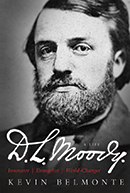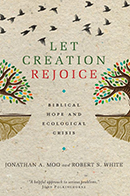
D. L. Moody, A Life: Innovator, Evangelist, World-Changer
Kevin Belmonte (Moody Publishers)
Few figures in American religious history have left a larger mark than Moody, the celebrated 19th-century evangelist who founded three Chicago institutions—a church, a Bible college, and a publishing house—that bear his name. Biographer Belmonte, also the author of works on John Bunyan, William Wilberforce, and G. K. Chesterton, is the latest to tell Moody's story. Belmonte's briskly paced narrative takes readers through the major episodes of the evangelist's life, concluding that Moody was "one of the great souls of history" whose "legacy as an author, educator, philanthropist, and preacher remains vibrantly alive."

Let Creation Rejoice: Biblical Hope and Ecological Crisis
Jonathan A. Moo and Robert S. White (IVP Academic)
People have various ways of responding to environmental doomsayers, ranging from stubborn denial to shoulder-shrugging indifference to activist zeal. Moo and White, professors of biblical studies and geophysics, respectively, ask what difference it makes when Christians "take seriously the picture of the future that Scripture paints for us. What does the Bible say about the future of the earth, and what difference does that make to how we live now?" Reviewing the environmental issues on today's agenda, including climate change, the authors conclude that there are sound reasons for thinking we face challenges of unprecedented magnitude. But they articulate a gospel hope that discourages fatalism and fanaticism alike.

Autopsy of a Deceased Church: 12 Ways to Keep Yours Alive
Thom S. Rainer (B&H Books)
Rainer, president and CEO of LifeWay Christian Resources, shares lessons learned from studying 14 churches that, after falling into decline, finally went belly-up. "The churches," he explains, "are diverse in their denominational or nondenominational backgrounds. They are diverse in their locations. They are diverse in their local and regional demographics." But they all "followed paths"—nostalgia for past glories, obsessing over facilities, slacking off on missions and prayer—"that caused them to die." After revealing his "autopsy" report, Rainer ends on a more hopeful note, offering recommendations for churches just starting down troublesome roads, churches in advanced states of decline, and churches on the brink of collapse.












